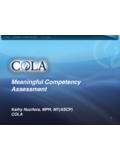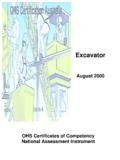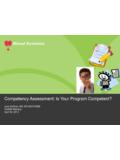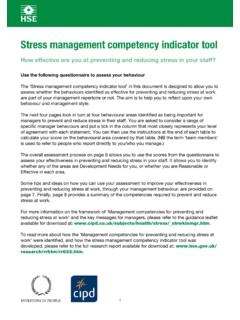Transcription of White Paper - The SHL Universal Competency …
1 White Paper 2012. The SHL Universal Competency framework Professor Dave Bartram White Paper | Universal Competency framework Summary The UCF is a single The SHL Universal Competency framework (UCF) presents a state-of-the-art perspective on competencies and underpins all of SHL's products and services. underlying construct The framework incorporates a model of performance at work that defines the framework that provides relationships between Competency potential, Competency requirements and competencies themselves. a rational, consistent The SHL UCF, supported by the UCF Database (UCFD) provides a comprehensive and practical basis and easy to use resource for the development and analysis of Competency models for the purpose of across a range of industries and locations.
2 It points to ways in which people and their work setting interact, and it has implications for how performance in the work place understanding people's can be managed. behaviours at work. Since 2001, the UCF has been used to create 403 new Competency models by 299 consultants working in 24 different countries with 117 client organisations. In most cases it has been used to assist major clients in building their own integrated corporate Competency models. It has also been used to map existing client models. It provides the ability to produce tailored Competency models quickly and efficiently from a standard set of components.
3 It reduces reliance on the particular skills and abilities of individual consultants or employees and produces a more consistent, high quality product for client organisations. This Paper explains the definition of competencies and how the UCF was built. It also outlines the key benefits of using a model for competencies and how such a model can be used to assess people in the workplace and, ultimately, to improve organisational performance. What is the Universal Competency framework ? It is a single underlying construct framework that provides a rational, consistent and practical basis for the purpose of understanding people's behaviours at work and the likelihood of being able to succeed in certain roles and in certain environments.
4 It is important because it builds on and moves ahead of the current state of the art in Competency modelling and Competency -based assessment. In the past, organisations have understood competencies only in the context of Competency dictionaries, which have perhaps comprised up to 60 competencies out of which they have chosen a sub-set of what they consider to be the most relevant. The UCF, on the other hand, supports a more structured approach that is evidence-based (see Bartram, 2005). The framework provides comprehensive coverage of the job Competency domain including: SHL's own standardised Competency models, including Perspectives on Management Competencies (PMC), Inventory of Management Competencies (IMC), Customer Contact Competency Inventory (CCCI), Directors Development Audit (DDA), and the Work Skills Competency Inventory (WSCI).
5 Models developed by other providers ( Hay, PDI, DDI, MCI, Lominger). Models developed by SHL clients and for SHL clients. 2011 SHL Page 2. White Paper | Universal Competency framework It also provides the basis for developing new Competency -based approaches to selection and development and it is backward compatible with SHL Competency - based assessment products, such as SHL's Decision Maker, IMC, PMC, CCCI, and structured application form (SAF) generation. A structured and evidence-based method of understanding behaviour in the workplace The UCF is a genuine framework '.
6 Lots of people talk about Competency frameworks, when what they mean are just collections of competencies. A framework is an articulated set of relationships It defines the nature of the components of a model It specifies how those components relate to each other It specifies how they relate to other constructs (performance, personality etc) that sit outside the framework It is also evidence-based and not just based on content analysis. The framework develops the concepts of Competency beyond the surface'. In other words, it delves deeper into the meaning of the description itself.
7 Rather than merely describing a set of behaviours as, for example, adapting and coping', it uncovers what this actually means through several layers of Competency components that make up that set of behaviours. Using the concepts of deep' or propositional' and surface' or expressed' structures as the basis for combining the benefits of both generic models and tailoring to client needs allows us to more fully and completely understand the underlying elements of behaviour The framework specifies the generic deep structure' of the Competency domain.
8 This expresses competencies in terms of generic propositions about behaviours in the workplace Specific Competency models are surface structures' or expressions' of those behaviours in the language of the client organisation Just as we can express the same proposition in language with many different sequences of words, so we can express the same competencies in different ways. The framework structure is like the grammar' of a language. The framework content is like the basic propositional meanings languages work from. Understanding competencies We define competencies as sets of behaviours that are instrumental in the delivery of desired results.
9 (Bartram et al, 2002). In the business environment, they are behaviours that support the attainment of organisational objectives. It is important to note the focus here is on behaviours and not on the results or consequences of those behaviours or on personal attributes that have no behavioural expression within the work environment. 2011 SHL Page 3. White Paper | Universal Competency framework Three other terms are relevant to the framework and need to be fully understood: Competence relates Competency potential, which is seen to derive from individual dispositions and attainments to performance or Competency requirements or the demands made upon people to display certain outcomes; competencies behaviours and not to display others.
10 These requirements can be both facilitators of, relate to the behaviours and barriers to, effective performance in the workplace. They can also be explicitly encouraged through line manager instruction, or implicitly through organisational underpinning successful norms and values performance. Results, which are the outcomes of behaviour, typically assessment through performance reviews and appraisals. The difference between knowledge and skills (competence) and competencies The UCF is not a model of knowledge and skills. Such models are often referred to as models of competence'.








